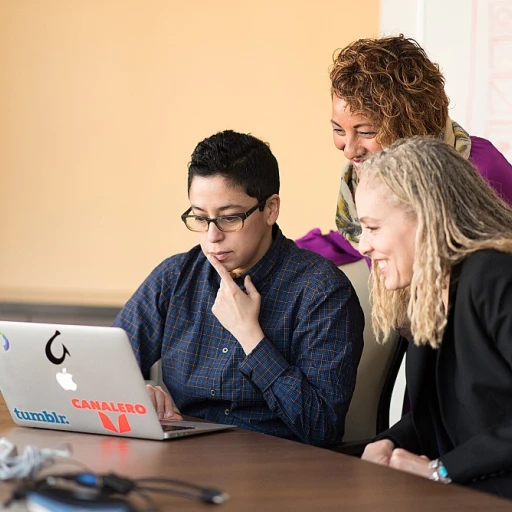
Understanding Equity in Reskilling
Embracing Equitable Learning in the Reskilling Landscape
Understanding equity in reskilling is essential for creating inclusive learning environments. Equity in this context goes beyond mere access to educational resources; it emphasizes learning opportunities tailored to diverse learners' needs. This concept ensures that all students, irrespective of their background, can participate fully in learning. In essence, equity focuses on leveling the educational playing field by considering individual and systemic factors.
The journey toward equitable learning is supported by data-driven insights and continuous improvement strategies. Gathering and analyzing data helps identify gaps in learning opportunities and craft targeted initiatives. A commitment to long-term improvement is necessary to keep pace with technological advancements and evolving learning environments.
Educational systems need to integrate policies that promote social justice by addressing barriers faced by marginalized groups. This equity-focused approach leverages digital tools to ensure equitable access and facilitates a more robust infrastructure for continuous learning.
Incorporating strategies like facilitator training can play a pivotal role in enhancing digital education models. Such efforts promote digital and paper-free methodologies, making reskilling accessible and effective for a broader audience.
Hayden Chen's Perspective on Learning Equity
Perspectives on Equitable Access to Learning Opportunities
The concept of equitable access to learning opportunities is crucial in promoting fairness and inclusivity within educational and reskilling programs. In discussions about learning equity, the priority is to provide every student, regardless of background, the chance to succeed in their educational journey. For example, the use of digital tools and resources helps level the playing field, giving individuals from diverse backgrounds the chance to acquire new skills.
Hayden Chen, an advocate for equitable learning initiatives, emphasizes the importance of continuous improvement in learning environments. By focusing on data-driven strategies, educational systems can identify gaps and address them effectively. For instance, data collection has become a powerful tool in understanding and improving the learning experiences of students, paving the way for a more equitable future.
Educational policies need to evolve to ensure that access to education and skill development is not just a privilege for a few, but a right for all. This vision aligns with social justice principles, striving to eliminate barriers that hinder equitable access to learning. By incorporating continuous improvement models, we can foster environments where every learner has the chance to thrive.
For those interested in creating equitable learning experiences, strategies such as implementing STEM education and promoting digital access are vital. These approaches not only support immediate educational needs but also prepare students for future work challenges. The shift towards a paper-free, more efficient educational system highlights the importance of equitable learning.
Learn more about unlocking potential through effective mentoring in reskilling and how it can support these ideals by reading our latest white paper. Download white today for deeper insights.
Challenges in Achieving Equity
Challenges in Promoting Fair Learning Opportunities
Equity in learning has long been a challenge in the realm of reskilling, and while strides have been made, numerous obstacles remain. These challenges often stem from a combination of systemic barriers and individual circumstances that prevent all learners from accessing equitable learning opportunities. To start, one of the primary barriers involves the unequal distribution of resources. This includes both digital tools for reskilling and broader systemic aspects such as educational policies and funding. These issues often result in disparities in how educational resources are allocated, resulting in unequal access to learning and upskilling opportunities. This is particularly true in digital settings where access to necessary technology can be a limiting factor for students from diverse backgrounds. Data collection and analysis are crucial for understanding these inequities. However, without robust data systems, it becomes difficult to implement effective strategies and educational models that promote social justice within the learning environments. Continuous improvement is often hindered by a lack of comprehensive, data-driven insights into where these inequities lie and how they can be addressed. Furthermore, the integration of digital tools must be approached with care to avoid exacerbating existing disparities. While digital advancements bring the potential for vast improvements in education, equitable access to these resources must be prioritized. This ensures that no student is left behind in the shift towards more digital, paper-free learning systems. In terms of policy, equitable learning also demands a re-evaluation of existing frameworks. Initiatives to drive equity must align with long-term educational outcomes, addressing not only immediate needs but also future work conditions requiring continuous reskilling. This often requires a multifaceted approach, where health and socio-economic barriers are also considered in the pursuit of equitable education. Finally, the challenges of promoting equity in learning are not isolated to the education sector alone. They demand a concerted effort from various stakeholders to develop equity-focused strategies—an approach that could draw insights from successful case studies where learning equity has been successfully fostered. Overcoming these obstacles is critical as we look towards the future of reskilling and upskilling. Emphasizing data-driven strategies and equitable access can ensure all learners have the opportunity to thrive in evolving educational landscapes. Through targeted policies and initiatives, we can bridge the gap and promote fair learning opportunities for everyone, thereby laying the groundwork for a more inclusive future. Unlocking potential with effective training programs is essential in this endeavor.Strategies for Inclusive Reskilling Programs
Building Inclusive Reskilling Programs
Creating equitable learning environments in reskilling initiatives requires a thoughtful approach that considers the diverse needs of students. Here are some strategies that can help ensure these programs are inclusive and effective:
- Data-Driven Insights: Utilize data collection to understand the unique challenges faced by different groups. This approach can help tailor educational models to better serve underrepresented communities, ensuring equitable access to learning opportunities.
- Equitable Access to Digital Tools: Providing access to digital resources is crucial. This includes ensuring that all students have the necessary technology and internet access to participate fully in digital learning environments.
- Continuous Improvement: Implement systems for continuous improvement in educational programs. Regular feedback and data analysis can help refine strategies and address any gaps in learning equity.
- Policy and Social Justice: Advocate for policies that support equity-focused initiatives. This involves collaborating with policymakers to create frameworks that promote social justice and equitable learning experiences.
- Health and Well-being: Consider the health and well-being of students as part of the reskilling process. Programs should incorporate support systems that address mental and physical health, ensuring a holistic approach to education.
By implementing these strategies, reskilling programs can become more inclusive, providing all individuals with the opportunity to succeed in the future work landscape. As we look to the future, continuous efforts in equity learning will be essential for long-term improvement and success.
Case Studies: Success Stories
Successful Initiatives in Equitable Reskilling
The journey toward equitable reskilling is dotted with inspiring success stories that provide valuable insights into creating effective and inclusive learning environments. These cases often highlight innovative strategies that prioritize continuous improvement and equitable learning opportunities for all students.
One successful initiative has been the integration of data-driven models in educational systems. By using data to understand the unique needs of diverse student groups, institutions have been able to tailor their reskilling programs to provide equitable access to education. This approach ensures learning experiences are customized, addressing both the current needs and future ambitions of students.
Furthermore, digital tools have played a crucial role in enabling these transformations. The shift towards paper-free and digital learning environments not only supports health and environmental initiatives but also promotes greater accessibility and interaction. By leveraging digital, students can access resources and learning opportunities from anywhere, paving the way for more equitable outcomes.
Another shining example comes from programs that focus on STEM education. These initiatives not only aim to upskill students but also work towards social justice by addressing gaps in representation and access. Equitable learning in STEM is particularly significant, considering its critical role in the future of work and long-term socioeconomic growth.
Continuous improvement and ongoing initiatives to enhance educational equity are essential. Policy changes that reflect a commitment to equity focused learning and provide equitable funding are steps that have shown positive impacts. These strategies foster an environment where every student has the opportunity to thrive, regardless of their background.
These success stories not only inspire but also provide a roadmap for other systems aiming to achieve similar outcomes. As educational institutions and policymakers strive to bridge the equity gap, the learnings from these cases illuminate the path forward, offering hope for a more just and equitable future in reskilling.













